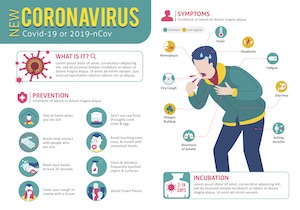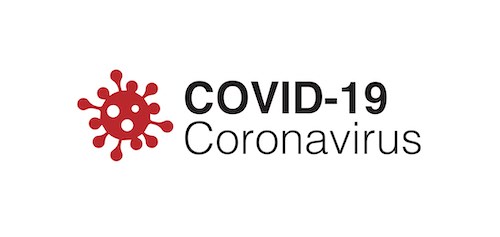
Based on current figures, around 80% of people develop mild symptoms, 15% develop severe symptoms and 5% become critically ill. The death rate stated by the World Health Organisation appears to be between 1-2% but these initial figures are unreliable, given that this situation is changing day by day.
Around 80% of people currently recover without medical treatment, and some become infected but do not develop any symptoms or feel unwell at all.
Symptoms and diagnosis
It’s said that COVID-19 starts with a fever, followed by a dry cough. It is reported to lead to many other possible symptoms such as shortness of breath, headache, tiredness, nasal congestion, sore throat, diarrhoea and muscle aches. Symptoms start off mild, but gradually get worse. There’s a new theory suggesting those infected lose their sense of taste and smell early on too, so treat this as an indicator unless advised otherwise.
There is a lot of talk about taking a temperature by using a non-contact thermometer and whether this is an effective way of detecting if someone is infected. It will show if the person has a fever which is a sign of Covid 19 infection, but it can take a few days to become sick once infected so someone may be infected but not show a temperature.
Free Coronavirus Course: Take the course: www.procoronavirus.co.uk or contact us on 01206 805359 to find out more about our company dashboards and solutions.
Preventing the spread
The main advice in preventing infection is to adopt good hand hygiene. Wash your hands frequently with soap and water or use alcohol hand gel. Hot air hand dryers will dry your hands but not kill the virus. The use of alcohol or chlorine spays over your body will not help if you are already infected.
Catch coughs and sneezes with disposable tissues and dispose of them correctly as soon as they are used. If you do not have a tissue, use your sleeve. Once you have sneezed or coughed, wash your hands or use alcohol hand gel. Avoid touching your eyes, nose and mouth with unwashed hands – this is how the virus gets into your body.
COVID-19 does survive on surfaces and you can catch it this way, so good surface cleaning is important. The WHO says that the virus can last on surfaces for up to 3 days; maybe more depending on the types of material, the temperature and humidity.
Avoiding close contact
COVID 19 is spread via human to human contact and from infected surfaces, but the new Coronavirus can be spread through respiratory droplets. These droplets are liquids that can be emitted when we cough or sneeze. These droplets are heavier than air and travel about one metre then rest on whatever surface they land on. The droplets can infect another person when they enter the body through the mouth, nose or eyes. This is why it is very important to avoid close contact with anyone who has fever, cough or any other respiratory symptoms that you suspect or know may have Coronavirus COVID 19. This means any contact of fewer than 2 metres between you and a sick person or someone you suspect of having the infection. Contact includes hugging, kissing, or shaking hands.
Currently, if a case is suspected, the patient and their belongings must be isolated in a room with doors and windows closed.
You should not enter the room until you have sought specialist advice and if you have already come into contact with the person, you should leave the room as quickly as possible and wash your hands thoroughly. You must try and identify potential cases as soon as possible, thereby eliminating transmission to other people. The current rule in the UK is that if somebody you live with is showing symptoms, you should self-isolate for 14 days.
Wash your hands
You can do your part in stopping the transmission of COVID-19 by using proper hand-washing techniques. There are some cases where hand-washing is a must, such as after using a toilet, coming into contact with any infectious material or when they are visibly dirty. In cases where you have come into contact with someone with a confirmed case of Coronavirus, or you suspect they have Coronavirus, wash your hands immediately, as well as frequently after then.
Some people just wet their hands when they wash their hands, but proper hand-washing includes using anti-bacterial soap. Alcoholic hand-gels are also effective, but you should try and use anti-bacterial soap where possible. There are many areas of the hands which people miss, including the backs of the thumbs, the tips of the fingers and in between each finger. When not washed, the virus can survive for days, and you will likely spread it to many people.
WHO recommends that the hand-washing process should take around 20 to 30 seconds minimum. This also means that you should remove any jewellery such as rings and watches before washing your hands, as these are often forgotten about but can easily harbour infection.
After removing jewellery, turn the tap on and wet your hands. Apply soap so that it evenly covers all surfaces of both hands. Then rub your palms together in a circular motion, before rubbing between your fingers. After, clean the knuckles and rub your thumbs in a rotating manner, making sure to clean between the thumb and index finger. Finally, clean your fingernails before rinsing thoroughly with water.
It’s then important to dry your hands – damp hands spread 1000 x the number of bacteria as dry hands do. It is advised that you use disposable paper towels to dry your hands and that you never use a reusable or communal towel. The advantage of using disposable towels is that once you have dried your hands, you can use that same towel to turn the tap or faucet off. Automatic hand dryers can be used, however using one means you have to touch the tap or faucet with your clean hands, contaminating them again. Proper hand hygiene is even more crucial than ever in today’s climate with the outbreak of COVID-19.
Use hand gel
When a tap and anti-bacterial soap is not available, alcoholic hand gel is an adequate replacement. You should only use hand gel if your hands are not visibly dirty, but they may be contaminated. The technique for hand-washing with alcoholic hand gel is very similar to that of washing in a sink or basin, however, there are one or two key differences.
After removing jewellery, apply an ample amount of gel to your hands, so that it evenly covers all surfaces of both hands. Then rub your palms together in a circular motion, before rubbing between your fingers. Then clean the knuckles and rub your thumbs in a rotating manner, making sure to clean between the thumb and index finger. Finally, clean your fingernails. This process should, like hand-washing, take around 20 to 30 seconds. However, you must not then either wash off the gel from your hands or use a dryer or paper towels to dry your hands. The gel will dry on its own and should take less than a minute. If you were to then dry your hands manually, you would end up rubbing off the gel meaning it may not kill all of the contaminants on your hands.
There are different types of hand gels available, but suitable and effective ones will contain at least 60% alcohol in them. Other ones may still work but are nowhere nearly as effective > 60%. Always read the label before applying and remember that this simple process could save lives.
Clean surfaces
A study of the Coronavirus has found that it can survive on surfaces such as metal, glass and plastic for a number of days. It gets there by being propelled through the air within mucus or droplets from infected people. These droplets then land on surfaces and may even be invisible to the naked eye. They provide an environment in which the virus can survive for long periods of time, and so it is a must that all surfaces that may be infected are cleaned with anti-bacterial products.
When wiping down surfaces, use an S-Shaped motion which will allow you to cover the entire surface area. Make sure that you pay extra attention to the sides, corners and edges of surfaces, as these are regularly forgotten but are just as likely to harbour the infection. Regularly change the wipe you are using, especially if it becomes visibly dirty. Make sure that you are using special antibacterial cleaning wipes as well, otherwise, you are just contaminating the wipes and possibly just pushing them around the surface, spreading the bacteria even more.
Wear PPE
If you are caring for someone, you should use the correct protection. Read our article here about masks: FFP face masks and Coronavirus COVID 19
Free Coronavirus Covid 19 onoine course
This course is designed to give the general population life-saving advice about the virus, helping them to avoid catching it and how to safely help someone with it.
Take the course: www.procoronavirus.co.uk or contact us on 01206 805359 to find out more about our company dashboards and solutions.
